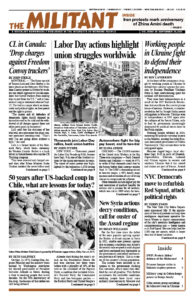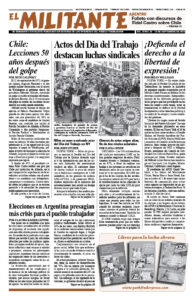Minutes after Ali Bongo Ondimba was reelected to a third term as president of Gabon Aug. 30, a coup led by Brice Clothaire Oligui Nguema, head of the country’s central security forces, overthrew the government.
Ali Bongo became president in 2009 following the death of his father, Omar Bongo Ondimba, who became president in 1967 with the backing of the French rulers, the former colonial power. The family is one of the richest in Africa, growing enormously wealthy in office by offering French companies favorable trade terms. Coup leader Nguema is Bongo’s cousin.
Hoping for change, crowds celebrated the coup in the streets of Libreville, the capital, and in Port-Gentil, the two largest cities. “Today we can only be happy,” John Nze, a resident of Libreville, told The Associated Press. “The country’s past situation handicapped everyone. There were no jobs.”
Gabon has one of the highest incomes per capita in Africa, with oil revenues of $6 billion in 2020 alone. And while education and health care levels are also higher, the reality is that more than a third of the country’s 2.3 million people live below the poverty line, many without regular access to electricity and other basic services. Unemployment for young workers — in a country where the median age is 21 — is almost 40%.
Gabon is almost 90% forest. The policies pursued by the Bongo family included using the forests to sell “carbon credits” to industrialized countries and oil companies. In forest communities farmers complain about the lack of roads that make transportation of crops almost impossible. The growing numbers of elephants in rural areas — a direct result of Bongo’s policies that prohibit ivory poaching — are eating their way through the fields. “Let the elephants vote for him” was a slogan of Bongo’s critics during the 2016 election. Most of the country’s food is imported.
The coup was the eighth across West and Central Africa since 2020 — all in former French colonies — and came five weeks after the government in Niger, 1,200 miles to the north, was toppled.
Each coup reflects tensions within the countries’ ruling classes over control of wealth and resources, amid jockeying for international allies to back up their regimes. To different degrees, all of the new military leaders claim their actions are aimed at the French rulers’ interference, taking advantage of deep hostility among millions to the imperialists’ plunder of the region. Following coups in Mali and Burkina Faso, French troops were kicked out of those countries by their new military rulers. French President Emmanuel Macron has rejected demands by Niger’s new government that they leave.
In contrast to countries across the Sahel, where French troops have been deployed to fight Islamist groups, Gabon has seen less military conflict. Some 350 French troops have been stationed in Gabon to train its military forces.
The 55-member nations of the African Union suspended Gabon’s membership on Aug. 31, condemning the military takeover.
Hours after Gabon’s coup, the president of neighboring Cameroon, Paul Biya, shuffled his military leadership. Rwandan President Paul Kagame has “accepted the resignation” of a dozen generals and 80 other senior military officers.

